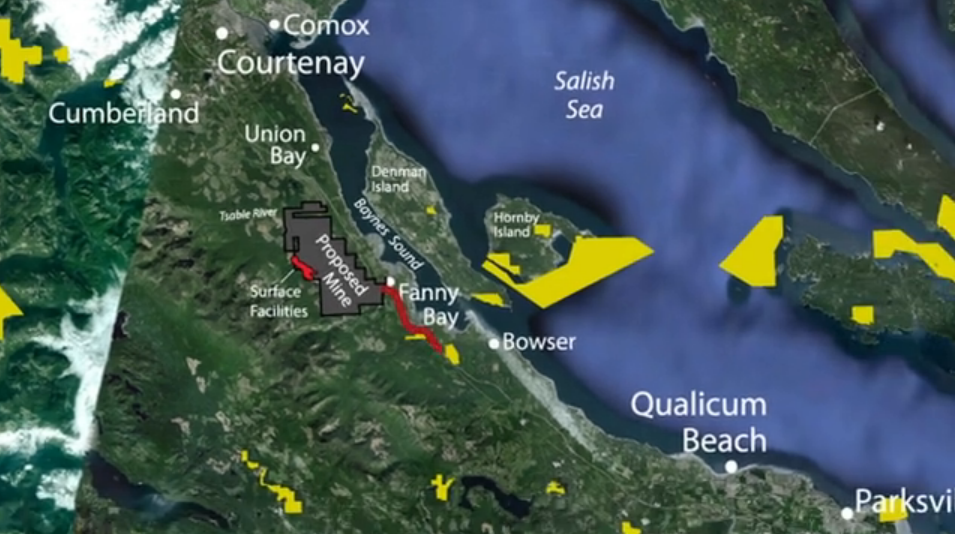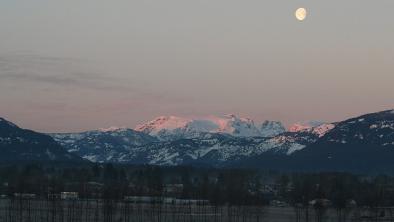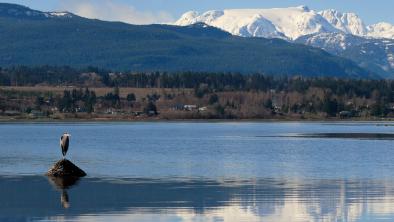VIEW: Why Vancouver Island can do better than Raven Coal

The Tyee
By Torrance Coste
March 28, 2013
Vancouver Island has a legacy of unsustainable resource development. It's come at high cost to the environment, and has largely excluded First Nations -- the Island's original inhabitants. But there is also hope here; there's hope that we can do better, that we can operate our economies in socially just and environmentally responsible ways. The Island is a region poised and eager to lead the development of the sustainable industries of the future.
There are communities all over Vancouver Island where truly exciting ideas and initiatives are springing up. And then there are proposals for ill-conceived and short-sighted projects that threaten to counteract this progress and drag us back decades.
Prime examples of both exist in the Comox Valley: a place of limitless potential for sustainable development, and site of Compliance Energy's proposed Raven Underground Coal Project.
The Comox Valley has done a great job developing more responsible industries. Some, such as the Baynes Sound shellfish industry, have been around for a long, long time. One of the most productive in the country, the industry has been a growing commercial sector for a hundred years. Going back further, the regions' native shellfish have been stewarded by First Nations like the K'ómoks since time immemorial.
Substantial investments have also been made in tourism, another lower-impact sector. Prioritizing tourism makes perfect sense here -- the region enjoys a pleasant climate, decent transportation infrastructure, and a smorgasbord of recreational opportunities and destinations, including Strathcona, British Columbia's oldest provincial park.
Every time I go to the Comox Valley I hear about new businesses that are thriving because of the area's natural capital, and they're doing so without detracting from it or compromising the ability for future generations to balance a strong economy with a healthy environment.
But I also hear about the proposed Raven coal mine. This 16-year project is guaranteed, like all finite resource extraction projects, to exhaust the deposit and immediately void the region of all associated economic benefit.
A proposal like Raven, in a region with this much potential, is utter insanity. This mine represents an ideological regression, a betrayal of future generations, and a fundamental rejection of hope and innovation.
This is strong criticism, so let me defend it.
I'll start with water, a basic human right. The proposed mine could use close to 500 cubic metres of water per day, the same as a medium to large hotel, just to wash the coal. After being used to rinse the coal of rock, residual minerals, and other waste, the water would be stored on-site in tailings ponds, which remain toxic for thousands of years. The risks mining poses to riparian ecosystems are incredibly high, and despite what the proponent claims, this project would jeopardize downstream water quality, upon which ecological and human health and the Baynes Sound shellfish industry are all dependent.
The picture doesn't get any prettier outside of the Comox Valley. The proponent has highlighted our public highway system as the cheapest and therefore preferred transport option. Why not? This socializes all infrastructure maintenance costs, creating more profit for the company at the taxpayers' expense.
Every hour, the mine would put at least three of the biggest trucks Vancouver Island has ever seen on Highways 19 and 4. This is a genuine safety hazard, especially in major tourism areas like Cathedral Grove and downtown Port Alberni.
The tankers that would take coal from the proposed port site to international markets in the Pacific Rim would be among the largest in the Alberni Inlet, a critical salmon migration corridor and ecologically important waterway.
This is a brief overview of just a few of the risks associated with this project, and although one or all of them could cause serious and irreversible damage, they are not the worst. What stands to lose the most with the approval of this mine is Vancouver Island's reputation.
Coal is a resource under fire in North America, and for good reason: it is always unsustainable, it carries high risk of local ecological and hydrological contamination, and it is a major source of climate-changing pollution. The "highest quality" coal, in the best case scenario, is used in the steel coking process -- an activity responsible for around eight per cent of global carbon dioxide emissions. The rest is burned for power production, recognized as the dirtiest form of energy in the world.
Because we know so much about the negative impacts of coal (both locally and globally), building coal mines and coal ports has grown very difficult on this continent. The U.S. coal industry is in free-fall, its investors in panic. If Raven is approved, the eyes of this industry could focus with renewed vigour on Vancouver Island. With coal producers currently looking for anywhere with social license to operate, they could see the Island as a place where environmentally destructive boom-bust operations are welcome.
The approval of the Raven mine would obliterate all standards regarding the kinds of development that is appropriate for the Island. If a risky, 16-year coal project can get approval in a region like the Comox Valley, there really won't be anything that could be considered out of the question.
This is shame, because we deserve better.
As an environmentalist, but moreso as a young Vancouver Islander, I know we can do better. The region should be a leader, not a follower. Economic development here should be driven by imagination and new ideas, grounded in the understanding of the ecological wealth of this place. Proposals like Raven represent a fear of change and a refusal to let go of the same finite resource cycle that has led to ecological damage and economic hardship up and down this coast.
I hope enough people understand this when it comes time to submit comments to the final environmental assessment process (expected sometime this spring, now that the final application has been submitted). I hope our federal and provincial environment ministers see this when they make their final decisions on the mine. And I hope future business leaders and those with ideas will see Vancouver Island for what it is: an ideal birthplace for sustainable alternatives, not an industrial zone for tired, archaic, and unsustainable development.

